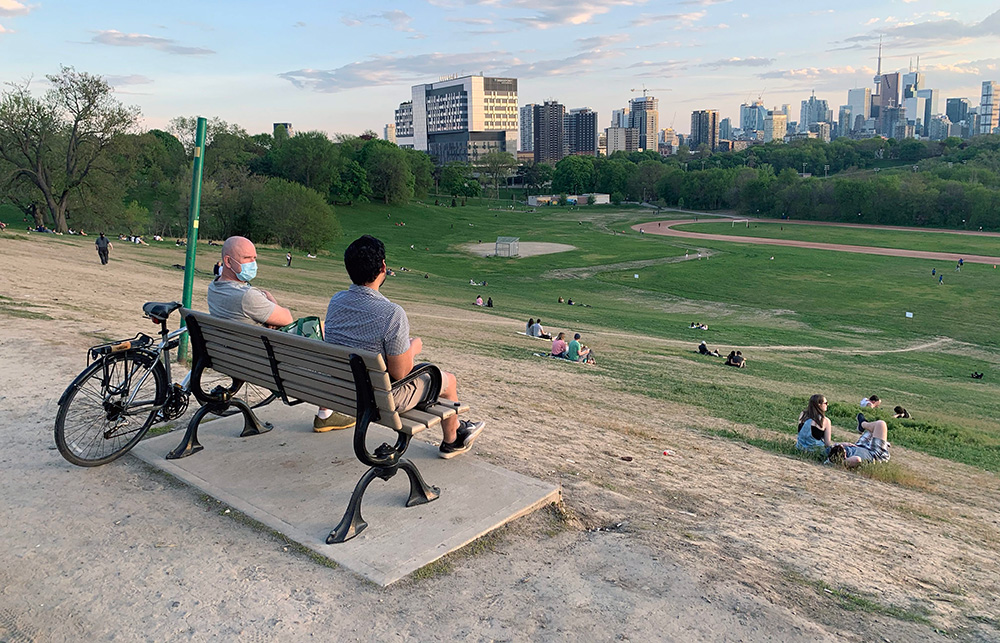Compiled by veteran medical journalist Brian Owens, this roundup of some of the newest science on the COVID-19 pandemic, straight from the scientific journals, is presented by Hakai Magazine in partnership with The Tyee.
For supply chains, length of lockdown more important than severity
The duration of pandemic-related lockdowns and the number of countries implementing them have a greater effect on global supply chains than the severity of the restrictions. A mathematical model of lockdowns and their associated economic losses found that earlier, shorter and stricter lockdowns can minimize overall losses. Gradually easing containment measures generates smaller losses than lifting restrictions quickly and then having to clamp down again.
Nature Human Behaviour, June 3, 2020
Virus lasts longer on surfaces in cooler, more humid cities (sorry Vancouver)
The time it takes for the respiratory droplets that carry the SARS-CoV-2 virus to evaporate depends on the local temperature and humidity, and that drying time is linked to how fast the virus spreads in a given city. Looking at six cities around the world — New York, Chicago, Los Angeles, Singapore, Miami and Sydney — researchers found that higher temperatures and lower humidity are associated with faster drying times and slower growth rates of infection. The type of surface also affects the drying time: smartphone screens, cotton and wood should be cleaned more often than glass and steel.
Physics of Fluids, June 9, 2020
Convalescent plasma treatment is safe and effective
Receiving a blood transfusion from a recovered COVID-19 patient can be a safe and effective way to treat the disease, according to a trial in Houston, Texas. Researchers treated 25 patients with convalescent plasma: 19 saw some improvement, and none experienced any adverse side effects.
The American Journal of Pathology, May 28, 2020
Social bubbles the most effective post-lockdown strategy
Social bubbles, or restricting interactions to a specific group of people, are the most effective strategy for controlling the spread of COVID-19 as lockdowns begin to ease. Other strategies, such as only having contact with people based on geography or membership in the same organization, or only meeting with groups of friends when you all have many friends in common, are less effective. However, combining two or all three of these strategies can also be effective, as people will eventually need to be able to interact across multiple social circles.
Nature Human Behaviour, June 4, 2020
Common indigestion drug may help mild COVID-19
Famotidine, a cheap and widely available drug for treating indigestion sold as Pepcid AC, appears to reduce the symptoms of COVID-19 in mild and moderate cases that do not require admission to the hospital. Ten people who started taking the medication while ill reported that their symptoms improved within 24 to 48 hours. The researchers say a rigorous clinical trial is needed to properly test the drug.
Big increase in psychological stress during pandemic
The percentage of U.S. adults who report symptoms of psychological distress has increased three-fold during the COVID-19 pandemic. According to a survey, 13.6 per cent of people studied were distressed in April, up from 3.9 per cent in 2018. They reported increased feelings of emotional suffering, and symptoms of anxiety and depression. Feelings of loneliness only increased slightly. Those aged 18 to 29, people earning less money, and Hispanic people reported some of the largest increases. People over the age of 55 reported the lowest levels of psychological distress. Another survey found that 80 per cent of U.S. adults say they will be more mindful about practicing self-care once the pandemic is over.
Fear of COVID-19 keeps heart attack patients away from ER
The number of patients seeking urgent hospital care for heart attacks has dropped by more than 50 per cent around the world during the pandemic. Of those who did go to hospital, 48 per cent arrived later than usual and after the optimal window for urgent treatment.
European Heart Journal, May 28, 2020
Keep doing CPR — the risk is low, and it’s worth it
Bystander cardiopulmonary resuscitation, or CPR, is a lifesaving measure whose benefits outweigh the risks of COVID-19 transmission, according to new research. Based on hospital data from Seattle, researchers estimate that the risk of performing hands-only CPR (chest compressions only, with no mouth-to-mouth breathing) without protective equipment would be low: just one rescuer death from COVID-19 in 10,000 CPR events. Bystander CPR, meanwhile, saves more than 300 lives per 10,000 patients with out-of-hospital cardiac arrest.
Kawasaki-like syndrome is a new condition
A severe inflammatory syndrome seen in a small number of children with COVID-19 is a new condition distinct from Kawasaki disease, which it resembles. Researchers have named the new syndrome Paediatric Inflammatory Multisystem Syndrome Temporally associated with SARS-CoV-2. The syndrome appears to be more likely to affect older children than Kawasaki disease, and more often involves abdominal pains and diarrhea alongside the common features such as persistent fever. It also appears to affect a higher proportion of Black and Asian patients.
British Medical Journal, June 3, 2020
Most antibody tests not ready for widespread use
Accurate antibody tests to detect who has already been exposed to COVID-19 will be critical to the next stage of the public health response. But despite a rapid increase in the number and availability of tests, most have not been independently validated. This lack of validation makes it difficult to decide which ones to use, and how to interpret the results.















Tyee Commenting Guidelines
Comments that violate guidelines risk being deleted, and violations may result in a temporary or permanent user ban. Maintain the spirit of good conversation to stay in the discussion.
*Please note The Tyee is not a forum for spreading misinformation about COVID-19, denying its existence or minimizing its risk to public health.
Do:
Do not: